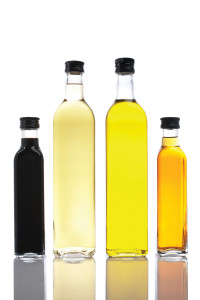Oil primer | by

From fat type to smoke point, experts talk cooking oil
If you are confused about which oils and fats you should be using in your kitchen for optimum health benefits, you’re not alone. Deciphering the labels and how to use each can be befuddling. We had local health experts weigh in to help you better stock and use the oils and fats in your pantry.
“Fats fill us up and are our highest energy source per gram,” says Deborah Gabriel, registered dietician and nutritionist with The Medical Center of Aurora. “They also help us absorb certain nutrients, such as vitamins D and E.”
A person can, however, eat too much fat. Home cooks should measure oils to build awareness of serving size. For example, 1 teaspoon of oil has 5 fat grams (45 calories) and 1 tablespoon has 14 fat grams (125 calories). “Fats are concentrated calories, and small amounts add up quickly, which can lead to weight gain and other health problems,” says Shannon Christen, a registered dietitian with the University of Colorado Health’s Cardiac and Vascular Prevention Program.
Not all fats are equal

Consumers should also know a fats’ smoke point – the temperature fats burn and break down into visible smoke. “Once that happens, it not only ruins the flavor of food, but its chemical composition changes, creating free radicals and oxidized fats that burden the body,” says Dr. Caitlin O’Connor, a licensed naturopathic doctor with All Families Natural Health.
Cold-pressed, virgin fats are also better for you since they are less refined. They are less shelf-stable, so buy them in reasonable quantities, she says.
Everyday-fats should come from the monounsaturated fats group, which can include:
Olive oil: best-suited to dressings, drizzling and low-temperature cooking because it has a lower smoke point; extra virgin is lighter than regular olive oil; select a reputable brand because some olive oils are diluted with cheaper oils.
Canola oil: derived from rape seed and a neutral flavored, everyday medium-temperature cooking oil.
Vegetable oil: a neutral, medium-temperature oil, but it has more saturated fat than canola.
Peanut oil: a neutral, high-temperature cooking oil good for stir fries and frying; people with peanut allergies can usually eat it.
Avocado oil: mild tasting with a high smoke point.
Second best are the polyunsaturated fats.
They help lower triglycerides and blood pressure and are anti-inflammatory. Christen says better oils in this category are ones derived from walnuts, sesame, and flaxseed.
Third in the hierarchy are saturated fats, which should be eaten sporadically. They include fats such as butter, lard, palm oil and coconut oil, although experts disagree about coconut and its relatively recent “health-food” status. Christen says minimize consumption. “It’s not a panacea. Coconut oil is 90 percent saturated fat, whereas butter is 65 percent saturated fat.”
However, Gabriel and O’Connor point to research supporting coconut oil’s immune-enhancing properties and medium-chain triglyceride structure that makes it easier to burn as energy and harder to store as fat. O’Connor uses it as an every-day oil, especially for high-temperature cooking. “If you are addressing problems via a therapeutic diet, you may need to do a low-fat, no-saturated diet. If you are healthy, there’s room for variety of fats,” O’Connor says.
The experts agree trans fats should be cut from your diet. Even labels with zero trans fats often have them hidden as “shortening,” “partially-hydrogenated oil,” or “hydrogenated oil” on ingredient lists.
Finally, storage is key. Keep them tightly sealed in a cool, dark place away from heat. To extend the life of rarely used flavored oils, such as avocado, sesame and walnut, refrigerate them.
Tags: nutrition
Leave a Comment
Please be respectful while leaving comments. All comments are subject to removal by the moderator.
